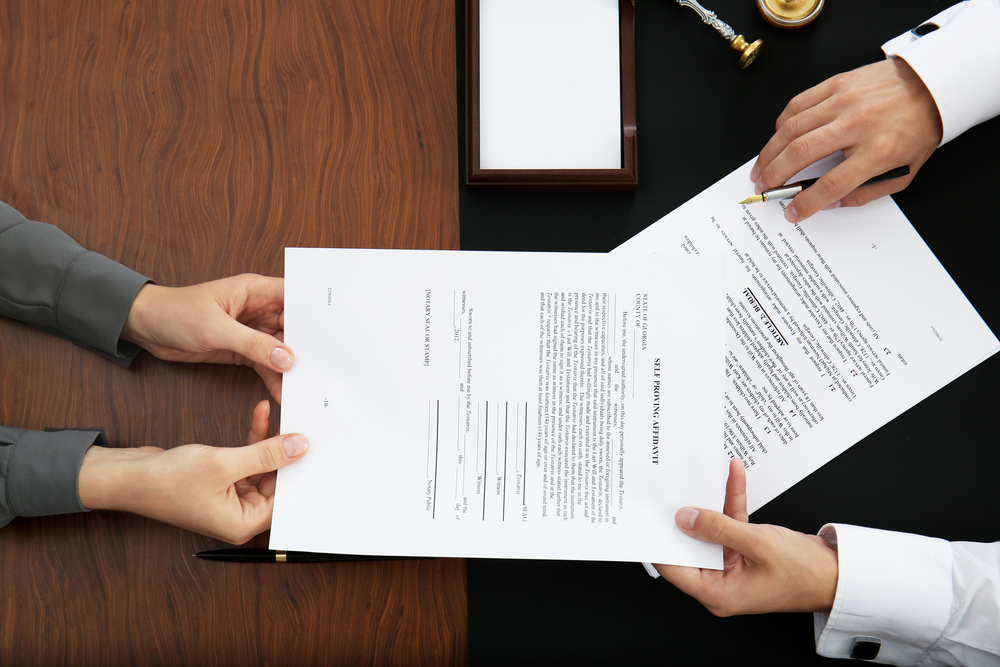When a couple decides to get divorced, it’s important to be aware and prepared for the legal proceedings that follow. Virginia couples seeking a divorce may not realize how much legal work is required to undo their marriage. Along with attending court hearings, there’s a lot of paperwork involved, and either or both spouses may be compelled to give testimony in a deposition.
It’s crucial to speak to a lawyer if you’re going through a divorce in Virginia and are filling out an affidavit or are about to undergo a deposition. Suppose you’re not careful with what you write in an affidavit or say during a deposition. In that case, it could significantly impact the outcome of your divorce, especially when it comes to alimony or child custody disputes. Keep reading to learn more about depositions and affidavits in Virginia divorce cases and how contacting experienced divorce lawyer Deering Hedrick to could help you.
When Are Depositions Required in Virginia?
A deposition is essentially an interview in which one party in a divorce is asked a series of questions by the other party’s lawyer. They usually take place in court, though they can also happen at an attorney’s office. If the deposition takes place in court, a court reporter will transcribe everything said by all parties involved in the deposition. If the deposition takes place outside of court, it can be recorded on video or by using an audio recorder to get an accurate record of whatever’s said.
According to Virginia law, depositions are rarely required in divorce cases. Instead, they’re a tool used by lawyers to obtain information that’s relevant to the divorce. This information can include things like:
- A spouse’s current employment and job history
- A spouse’s finances
- Any history or evidence of adultery
- Any history or evidence of domestic violence or child abuse
Anything you say in a deposition is considered legally binding. So it’s important to tell the truth when you’re being questioned. You’ll also want to consult with your lawyer ahead of time to ensure you’re as prepared as you can be. Being consistent in your deposition and other testimony is crucial, as your spouse could use any discrepancies in your story against you.
What is Divorce by Affidavit?
An affidavit is a legal document in which one or more parties affirm that a certain set of facts is true. If a couple going through a divorce agrees on all the relevant issues and wants to avoid the hassle and expense of a lengthy court case, they opt for a Divorce by Affidavit.
To get a Divorce by Affidavit in Virginia, there are three conditions you and your spouse must meet, which are:
- The divorce must be uncontested, meaning you and your spouse agree on how you want to divide your assets, who will have custody of your children, how much you or your spouse will pay in alimony and child support, and so on.
- You and your spouse must have lived separately for six months if you have no children under age 18 or one year if you have a child under age 18.
- You’re filing a no-fault divorce, meaning neither spouse says the other is the cause of the divorce.
Assuming you meet these conditions, getting a Divorce by Affidavit is fairly quick and relatively simple. The information required in the affidavit includes:
- The date of your marriage
- The date of separation
- The names of any children from the marriage
- Any signed documents showing how your shared property will be divided
You’ll also need a witness to sign the affidavit and verify certain information, such as:
- How often the witness has spoken to you since the separation
- If the witness has visited your home since your separation
- How long you and your spouse have lived separately
One convenient aspect of a Divorce by Affidavit is you can fill out the forms anywhere. If necessary, you can even fill it out when you’re in another state or country. After you’ve signed the forms, your attorney can file them with the court.
Why Do I Need a Lawyer?
If you’re being deposed as part of your divorce, you absolutely need a lawyer. Every word of your testimony will be scrutinized, and any differences between what you say in the deposition and have said previously can be used as evidence against you. A lawyer can prepare you for a deposition to help keep you out of trouble.
A lawyer can also help you fill out a divorce affidavit and make sure all the forms have been completed correctly. Any problems with your affidavit could seriously complicate your divorce, so it’s a good idea to have your lawyer review it.
Contact Deering Hedrick
Depositions and affidavits are just some of the ways the Virginia Beach divorce lawyers at Deering Hedrick could help with your divorce. To learn more about our services in Virginia, contact us today.








